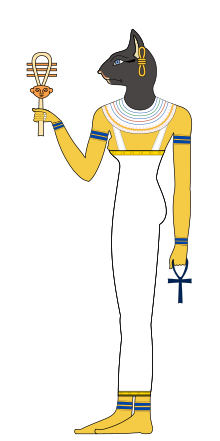Bastet
| Bastet | |||||
|---|---|---|---|---|---|
| Goddess of cats, protection, joy, dance, music, family, and love | |||||

Bastet in her later form as a cat-headed woman.
|
|||||
| Name in hieroglyphs |
|
||||
| Major cult center | Bubastis | ||||
| Symbol | lion, cat, the sistrum | ||||
| Consort | (in some accounts) Anubis, (occasionally) Ptah | ||||
| Parents | Ra, (in some accounts) Isis | ||||
| Siblings | Tefnut, Shu, Serqet, Hathor, Horus, Sekhmet, Anhur; (in some accounts) Ammut and Thoth | ||||
| Offspring | (in some accounts) Khonsu, (possibly) Nefertem, (possibly) Maahes | ||||
Bastet was a goddess in ancient Egyptian religion, worshiped as early as the 2nd Dynasty (2890 BC). As Bast, she was the goddess of warfare in Lower Egypt, the Nile River delta region, before the unification of the cultures of ancient Egypt. Her name is also translated as Baast, Ubaste, and Baset. In Greek mythology, she is also known as Ailuros.
The uniting Egyptian cultures had deities that shared similar roles and usually the same imagery. In Upper Egypt, Sekhmet was the parallel warrior lioness deity. Often similar deities merged into one with the unification, but that did not occur with these deities having such strong roots in their cultures. Instead, these goddesses began to diverge. During the 22nd Dynasty (c. 945–715 BC), Bast had transformed from a lioness warrior deity into a major protector deity represented as a cat.Bastet, the name associated with this later identity, is the name commonly used by scholars today to refer to this deity.
Bastet, the form of the name which is most commonly adopted by Egyptologists today because of its use in later dynasties, is a modern convention offering one possible reconstruction. In early Egyptian, her name appears to have been bꜣstt. In Egyptian writing, the second t marks a feminine ending, but was not usually pronounced, and the aleph ꜣ (![]() ) may have moved to a position before the accented syllable, ꜣbst. By the first millennium, then, bꜣstt would have been something like *Ubaste (< *Ubastat) in Egyptian speech, later becoming Coptic Oubaste.
) may have moved to a position before the accented syllable, ꜣbst. By the first millennium, then, bꜣstt would have been something like *Ubaste (< *Ubastat) in Egyptian speech, later becoming Coptic Oubaste.
...
Wikipedia
